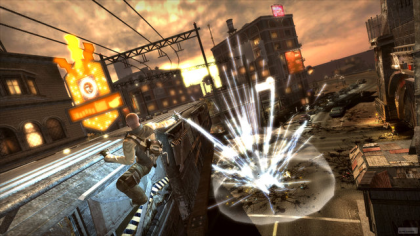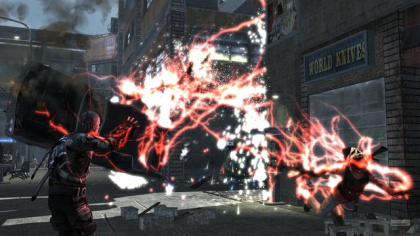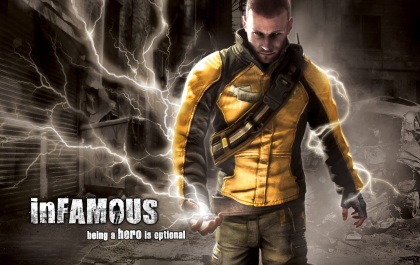Last month, Sucker Punch Productions released their PS3 exclusive sandbox-style game, Infamous. Taking place in New York Empire City, Infamous follows the exploits of Cole McGrath, a bike-courier-turned-human-dynamo-in-a-terrible-accident. As Cole, players explore the post-accident Empire City, fighting the gangs who have taken over since the government left town, while trying to discover the the truth behind his powers. Cole is kind of like a mix of Spider-Man and Black Lightning: he scales buildings, vaults off power-lines, rides electrified train rails and zaps baddies from afar. The comic book superhero comparison is accurate; the game’s narrative cut-scenes don’t use the game engine, but an animated digital comic style. One of the most-reported features, in keeping with the sandbox nature of the city, is the ability for players to choose whether Cole is inherently a good guy or a bad guy, allowing the game world to change, depending on his choices.
Infamous is massively fun. All of the mechanics come together seamlessly, as Cole runs up the side of buildings, vaults rooftops, and drains electric power sources, often while fighting opponents. The plot, while simple, is really artfully constructed, and the missions deliver overall a lot of variety, even if the side-missions get a little repetitive by the end.
If there’s any major critique to this game, it’s that the moral choice feature, so talked up in the advertisements, really has very little overall effect on the story or even the game environment, and while not really bringing the game down, it’s disappointing to see such a major feature fall short of what it promises.
Cole’s free-running abilities are considerably less precision-oriented than similar features in Assassin’s Creed and Mirror’s Edge. If Cole jumps near a pipe, or handhold, he’ll automatically grab it. If he leaps off a building over a powerline, he’ll almost always land on it. Sucker Punch clearly intended for free-running to help create the experience of the powers rather than act as another set of obstacles to be overcome. This is fine, because the various enemies in this game are actually pretty hardcore, even on the lower levels of difficulty. While the peons don’t have any powers, most of them carry assault rifles and shotguns, and higher level baddies have powers that are often similar, or even superior, to your own. Being able to easily use the physical environment to hide, get a better position, outflank, etc., is really Cole’s only consistent advantage against many of his opponents, and making those abilities more difficult to achieve could have made the gameplay massively painful instead of fast and open-ended. Based on their exact position on the moral compass, players can have access to one of two power trees, the “Hero” tree and the “Infamous” tree. The Hero tree focuses on sustainability and non-lethal takedowns. The Infamous tree’s only focus is on causing as much collateral (and cascading) damage as possible. A heroic player will be able to heal himself in combat and will eventually gain access to powers that will let him chain experience gains together for lots of bonus points. An infamous player will probably set new records for “X number of people murdered by tossing an exploding car into that gas station to kill the one guy on the roof.”

I have to admit, I spent hours messing around with Cole’s abilities without even doing any missions. Literally power-surfing the cityscape is exciting, particularly when finishing it off with a ballistically-powered explosive drop that sends a gang of enemies (and every car in the vicinity) flying. Cole has so many different powers, it’s easy to see how a dozen players could come up with a dozen equally valid ways of approaching a difficult combat situation.
The plot is structured very similarly to Grand Theft Auto with mission assignments delivered by going to specific locations and different parts of the city locked off until a particular level of progression has been achieved. Cole gains new powers over the course of the story, but builds them up using experience points gained from beating bad guys and completing missions (most of which are optional). Hardcore players looking for challenges (as well as folks who rent) can complete the plot-only portion of the game in probably 8-10 hours. Completing every side missions will bump it up to at least 18 hours, but players who choose to do so will be able to max out all of Cole’s powers, which makes for much easier progression later on.

The plot itself is relatively simple; as Cole tracks down clues as to how the event which gave him his powers came about, he comes into contact with other people doing the same thing for reasons of their own (hint: most of them want power, and aren’t nice people). The narrative is based around the question of what would a regular person do when presented with the kind of power that Cole possesses (and steadily gains more of), and this recurring theme presents itself over and over again throughout the game, but with a rising level of tension that contributes towards each successive encounter serving only to increase the sense that events are coming closer and closer to a horrible head. The development team made a very smart stylistic decision to use digital comic-style cutscenes instead of using the game engine, which helped make each scene much more exciting and interesting. Players who have played Metal Gear Solid: Portable Ops will recognize the style. It’s one that I really like, since I feel like this choice allows the writers to add much more dynamic material to cutscenes that would otherwise be long and painful to watch in engine.
As I mentioned previously, the only real problem with the game is how the moral choice feature completely fails to have an significant bearing on the game at all. While particular choices will push you deeper towards either the “good” or “evil” end of the pool, which does affect which powers you can get, those same choices won’t really affect the plot or basic gameplay beyond minor cosmetic changes like the crowds cheering or booing you. The missions will always be the same, and the outcomes are always, for the most part, the same. It’s almost like the plot and the moral choice system were designed completely separate to one another, because neither one has any consequences upon the other, and without consequences, a moral choice is essentially meaningless.
Despite my disappointment over the moral choice feature, I do highly recommend Infamous. The gameplay is engrossing and dynamic, the plot is interesting, and I suspect many players, like me, will enjoy simply blasting around the city, messing around with their powers.
Now the only question on my mind is how similar this game is to Prototype (on my gamefly queue :P). How much room is there in this market for more sandbox-platformer games based around power-evolution and the corruption of the human spirit in an analogue New York City?










